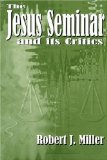 Robert J. Miller, The Jesus Seminar and its Critics. Santa Rosa: Polebridge Press, 1999. 154 pp. plus indices. Paperback. ISBN 0-944344-78-X. Reviewed by Robert M. Price.
Robert J. Miller, The Jesus Seminar and its Critics. Santa Rosa: Polebridge Press, 1999. 154 pp. plus indices. Paperback. ISBN 0-944344-78-X. Reviewed by Robert M. Price.
If you had any remaining questions about the methods, goals, and origins of the notorious Jesus Seminar, this book by my Seminar colleague and pal Bob Miller ought to put them to rest. In clear, concise, and frank speech, Miller deals one by one with the (mostly absurd) criticisms of the Seminar. Of course there is plenty of room for specific disagreements with the published results of the Seminar (I have plenty of qualms myself), but that’s not the sort of trouble that called forth this book. Miller addresses himself to (often one suspects) willful misunderstandings and blatant misrepresentations of the Jesus Seminar. Sadly, the polemic Miller addresses here is the sort of underhanded mud-slinging practiced by politicians, usually not by scholars. And Miller makes quite clear that much if not most of this criticism stems from two sources: orthodox apologists who despise New Testament criticism for (inevitably) rocking, no, sinking the boat of traditional faith; and fellow critics to whom the findings and methods of the Seminar must be old news, but who do not want the New Testament’s dirty linen to be hung out for the Babbit-like laymen and harumphing clergy on seminary boards to see.
Miller explains in detail the voting procedures and the Seminar’s system of color gradations (both adapted from the procedures of the United Bible Society’s text-critical deliberations). He goes on to explain the differences between faith’s supposed knowledge and the probabilistic conjectures with which historical method must ever remain content. Two chapters are devoted to the explication and refutation of the critique in The Real Jesus by Luke Timothy Johnson (whose name is a veritable canon of scripture by itself!). Johnson is a kind of modern-day evil twin of the excommunicated Alfred Loisy, one of the Catholic Modernists of the 19th century in that both reasoned that, if you have an alternate epistemology in Church Tradition, you don’t especially need accurate gospels. Only whereas Loisy combined faith in Tradition with radical skepticism to produce some of the finest New Testament criticism on record, Johnson alchemically transmutes skepticism into fideism and champions retrograde, pre-critical positions, even when he admits they are baseless. Another chapter (based on a review essay I asked him to do for The Journal of Higher Criticism; he apologizes for the sarcastic tone of the original publication, but you ought to see some of the cracks I edited out!) dissects Ben Witherington’s insufferable nonsense in The Jesus Quest. Miller deals with William Lane Craig only in a series of footnotes, even though Craig is even more of a fake than Witherington. And he hardly mentions the loathsome N.T. Wright, who is simply Jerry Falwell in a better suit, a grinning pitchman for the Grand Inquisitor. That’s disappointing, since Wright is certainly one of the chief critics of the Jesus Seminar.
All the chapters were originally separate articles, published in recondite sources. But Miller has evened them out here into a seamless whole. He is a master of striking analogies and communicates quite clearly. It is only too bad he does not give his devastating sense of humor free reign.
I took umbrage at a couple of remarks in this book, such as the pat dismissal of radical critics who deny the historical existence of Jesus. I wonder how someone as keenly perceptive as Miller can not see that, given the entirely mythic character of the gospel story of Jesus, the burden of proof is on anyone who would venture to find there any more of an historical core than for Asclepius or Oedipus. Similarly, Miller seems to take for granted that the Muslim/docetic belief that Jesus escaped crucifixion is nothing but a dogmatic fantasy, since he employs it as a foil for any and all historical theories about the historical Jesus. Well, true, it is now Islamic dogma, but the opinion entered Islam from Christian converts to Islam and grows out of a certain (and surprisingly compelling) line of arguments from the gospels. In other words, it may be wrong, but it is as much an historical estimate as the version Miller prefers. Again, Miller appears to take for granted that Christianity must be an historically based religion that would perish without rootage in the facts, some facts anyway. It cannot be, for some reason, a religion of pure spirit, like Buddhism. But is this necessarily so?
For me, the most interesting chapter was the final one, “Apologetics and the Resurrection,” in which Miller distills the whole apologetical enterprise to the psychology that motivates it and demonstates how apologetical arguments are really aimed at doubters within the community of faith, not at potential converts without. One wonders if the same will prove the case with the present book.

